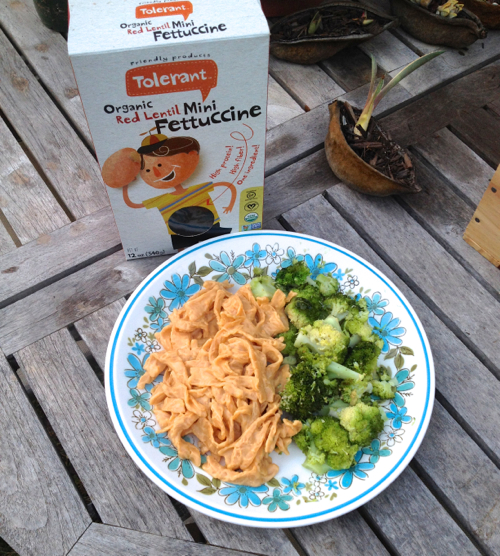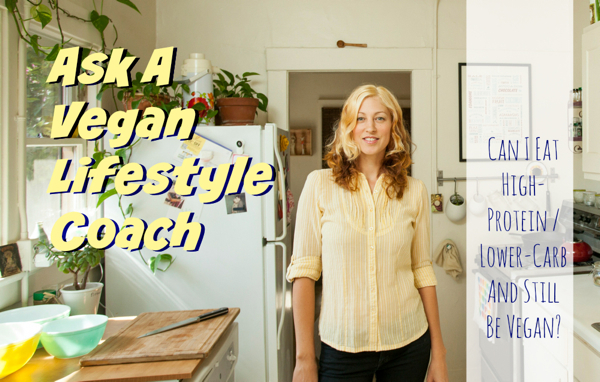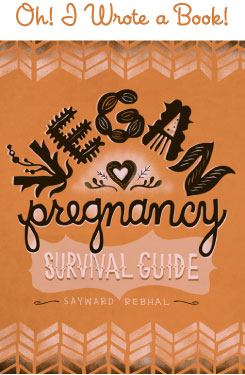I recently got an email from a reader that went something like this:
I’m an on-again off-again vegetarian looking to go vegan. My doctor recently told me that I have to decrease my carbohydrates and increase my protein (she said it had to be animal protein) in order to lose the weight I gained when I went on a new medication. I already eat a lot of beans and some fake meats as well, but she told me that these aren’t a good substitute. I need to know what kinds of non-animal, low-carbohydrate protein options are out there. I really want to stay veg but I don’t know how to do this. I would really appreciate your help!
And as I was writing bak to her, I realized that I was sharing this info for like, the bazillionth time. In other words, I have gotten this question or similar questions a whole lot, so it occurred to me that I might as well just go ahead and share my answer here on the blog! And thus a new series was born: Ask A Vegan Lifestyle Coach.
So here’s my answer, to her and now to all of you . . .
I’m so sorry that you’re dealing with unwanted weight gain, and I actually agree with your doctor when she advises that increasing your protein intake while decreasing your carbs may be able to help you manage that. However, I disagree (shocking, I know!) that the protein needs to come from animals. Humans are able to extract quite a bit of concentrated protein without resorting to meat-eating, and you don’t even necessarily need to eat the processed vegan meat analogues if you’d rather avoid them. The following are a few of my favorite high-protein plant foods:
It sounds obvious of course, but tofu! tofu! tofu! I would load up on it if I were you. It’s high in protein, has a little fat (the good kind), and is relatively low in carbs. When buying tofu, opt for organic whenever possible.

Other legumes, like beans, also offer good protein, but they tend to come with more carbs. So here’s a good tip: if you’re doing a greens/beans/grains bowl, you can skip the grains to reduce the carbs, and let the beans and greens take center stage. Lentils with steamed kale or steamed broccoli is a favorite of mine, covered with a delicious sauce like The Tahini Sauce That Done Stoled My Heart or a Spicy Cilantro Peanut Sauce. I like to add extra flavor with green onions, pickled vegetables or sauerkraut or kimchi, and/or avocado. If you just serve beans and steamed greens alone, it will be super boring (of course). But if you add a mouth-watering sauce (nut- or seed-based will add extra protein) with those extra “flavor-makers” on top — well there you have a delicious, satisfying, and high-protein meal!
Just make sure you skip the grain (especially high-carb grains like rice, barley, or corn), unless you are opting for a protein-rich grain (like quinoa, amaranth, or wild rice).
Buckwheat is one of my favorite higher-protein grains. You can eat it whole as “kasha”, or you can find 100% buckwheat noodles (make sure they’re 100% because usually they’re cut with refined wheat which makes them more of a carb) for awesome noodle bowls. Stir fried veggies with chickpeas or tofu or seitan (“wheat meat” made from vital wheat gluten, aka wheat protein), served over buckwheat noodles, is simple and delicious and much higher in protein than a normal stir fry or a normal noodle dish. I order my 100% buckwheat soba noodles in bulk packs online, here. They can be hard to find but if you’re in a bigger city I’d check your local co-ops and health food stores.

Speaking of high-protein noodles, there are a few brands on the market that are making pasta out of legumes. They are super high in protein (like 23 g per serving) which is awesome, and they make things SO easy! I mean, pasta with red sauce becomes a high-protein, low-carb meal! I love Tolerant Foods the best (they make all different shapes and styles from red lentils, green lentils, and black beans), and there’s also a brand called Explore Asian which makes spaghetti and fettuccine out of mung beans, black beans, soy beans, and more. Honestly I love all of the high-protein pastas!
Breakfast can be hard as a vegan, and tends to be pretty carb-centric. Tofu scramble is good, but can feel repetitive if you’re eating a lot of tofu dinners. Recently a few new vegan yogurts hit the market, and they’re FINALLY higher in protein like their dairy counterparts. My favorites are Kite Hill and Daiya, both of which have 6+ grams of protein per container. These should be available at Whole Foods or other health food stores.
My other go-to high-protein vegan breakfast is my old favorite, the chickpea flour pancakes. They remind me of omelets and since they’re made from legume flour, they’re super high in protein. I have the recipe for mine here.
The thing about most vegan protein sources is that they *DO* come attached to some carbs. So the strategy becomes this: you have to eat lots of these awesome vegan protein sources, and you have to include more of them in your diet wherever possible. And then, you ALSO have to eliminate errant and unnecessary carbs elsewhere in your diet. So like I said above, instead of the greens/beans/grain bowl, just do a greens + beans bowl. Instead of wheat pasta, use a high-protein legume-based pasta. Instead of a wheat bun or bread on a sandwich, put the patty on a bed of kale, or wrap it in cabbage leaves. Instead of making a burrito, pile all the burrito fillings in a bowl on top of lettuce, minus the tortilla. Replace snack foods like chips, crackers, and popcorn, with less carb-centric options like kale chips, nuts or seeds, or carrots sticks with guacamole. All of these little alterations will add up throughout your day.
So bottom line, if you can increase the plant-based proteins while simultaneously lowering the non-veggie carbs, then there’s no reason why you won’t be able to have an optimal protein-to-carbohydrate ratio — all the while remaining veg.
I hope that helps, and good luck with your journey!
——————————————————————————————————————————————————-
Hey-o! So hey there, I am a certified Vegan Lifestyle Coach and I have a BA in biology, but I’m not an MD, an RD, or any other kind of “D” for that matter. I am super duper not a doctor, or a nurse, or a health care practitioner of any kind. This post represents my personal thoughts and opinions and is in no way meant to be taken as medical advice. Okay? Whew!
-
lysette
-
Sarah C.
-
stephie137
-
Lisa
-
Jennifer
-
jill
-
Rachel Deines
-
http://bonzaiaphrodite.com/ Sayward Rebhal
-
http://bonzaiaphrodite.com/ Sayward Rebhal
-
http://bonzaiaphrodite.com/ Sayward Rebhal
-
http://bonzaiaphrodite.com/ Sayward Rebhal
-
http://bonzaiaphrodite.com/ Sayward Rebhal
-
http://bonzaiaphrodite.com/ Sayward Rebhal
-
http://bonzaiaphrodite.com/ Sayward Rebhal
-
Sarah C.
-
http://bonzaiaphrodite.com/ Sayward Rebhal
-
Sarah C.
-
Sarah C.
-
http://www.one-sonic-bite.com/ Jennifer
-
Liv Reiners
-
Martine van Haperen
-
http://angieeatspeace.com/ Angie
-
Sonja
-
Michelle
-
Kate
-
Jessica Minguez




